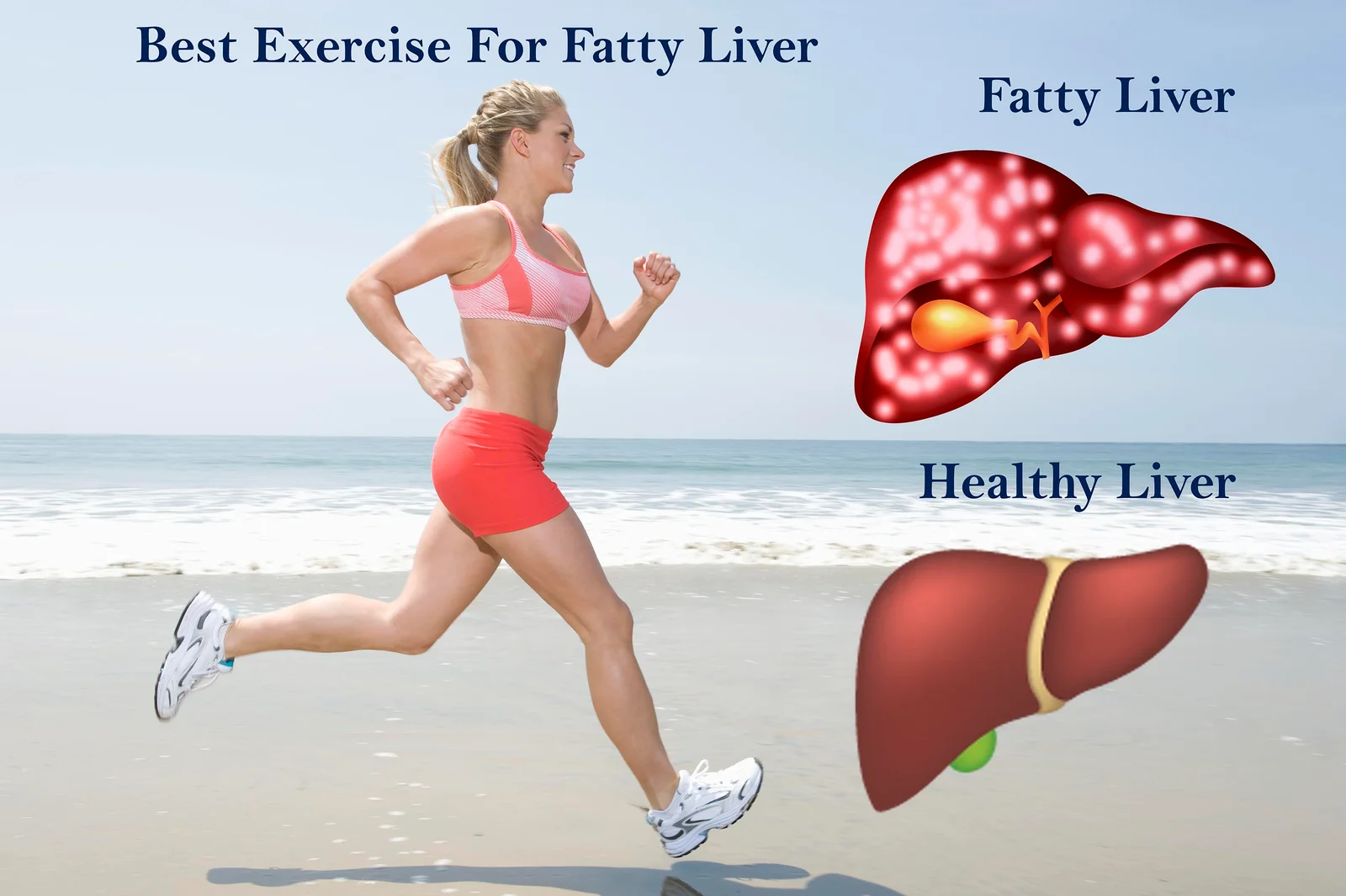Best Exercise For Fatty Liver.
I want to share with you the best exercise for a fatty liver. Exercise will deliver about 15% of the results when it comes to fat loss.
First, you will want to lower your carbohydrate intake, do intermittent fasting, and add more choline to your diet.
A fatty liver can cause inflammation, which can lead to cirrhosis of the liver. If you want to prevent inflammation and cirrhosis, you have to lower your liver fat.
The liver is the only organ that can completely regenerate. The bad news is that it can take a lot of time—often one to three years.

Physical Exercise For Fatty Liver:
Regular high-intensity interval training exercises such as squats, running cycling and elliptical or cross-training will benefit fatty liver disease patients. Vigorous activity at least 3 days/week if you are regular to exercise. These exercises will show results over a period of 1 month and improves the maximum oxygen consumption and a good amount of achieved workload.
List of exercises for fatty liver to do at home:Best Yoga Asana to Relieve Constipation Naturally
Does fatty liver go away with Exercises.
The best exercise for a fatty liver is any exercise. As long as you get your body moving, you’re going to benefit.
This includes:
• Low-intensity workouts
• Compound resistance exercises
• Weight training

The benefits of exercise for fatty liver are:
- Increases fat oxidation.
- Improves insulin resistance.
- Reduces the conversion of glucose to fat.
- Reduces inflammation.
- Reduces fibrosis.
Does fatty liver cause pain?
Is fatty liver reversible with Diet?
Fatty Liver DO NOT IGNORE These Symptoms. Fatty liver is closely related to obesity, high cholesterol, and hypertension. Although it is difficult to detect, there are some symptoms that can indicate this disease.What can be the warning signs of fatty liver?
Are they easy to identify or are they only detectable in laboratory tests?
Are fever and abdominal pain among them?
When fat accumulates in liver cells, it is called hepatic steatosis, that is, fatty liver. This is a disease that prevents the liver from performing its functions properly.
What does the liver do?
The liver is responsible for several processes:
People who regularly consume excess alcohol are very prone to fatty liver. However, alcoholism is not the only risk factor associated with this disease. Other associated factors are:
Now let's see,
6 warning signs of fatty liver.
In most cases, hepatic steatosis is asymptomatic. That means that until the person is tested, it is difficult to detect. Some tests that are used to diagnose this disease are:
So there is no set of signals that specifically warn about fatty liver. However, it should be noted that some patients do experience symptoms or specific health problems that can be related to fatty liver.
Abdominal pain: According to what some patients have experienced, one of the warning signs of fatty liver is abdominal pain. Although not the one that appears in isolation, but the one that occurs together with other annoyances. It is experienced in the center or upper right part of the abdomen. However, it does not have to do with a specific activity or effort. It can appear after eating because the stomach expands and presses on the enlarged liver.
Abdominal bloating: Another possible warning sign of fatty liver is abdominal swelling which is also known as ' ascites. ' It consists of fluids between the visceral and parietal peritoneum and is usually a consequence of liver disease.
The symptoms of ascites are:
Fatigue: One of the possible warning signs of fatty liver is a lack of energy and constant fatigue. As the liver cannot function properly, the metabolism slows down, and then unexplained tiredness appears. It is also possible to experience concentration problems, confusion, among other symptoms.
Dark urine: Through urine, we can detect some ailments or diseases. Do not forget that this liquid carries toxins and waste. In the case of fatty liver, the urine will be a darker color than usual. In addition, the stools may also show changes, be whiter or clay-colored, and more stench than usual.
Skin changes: Another of the warning signs of fatty liver has to do with changes in the skin. The most significant difference in the skin when there is a fatty liver is the appearance of jaundice.
This yellow coloration appears on the skin and mucous membranes due to the increase in the levels of bilirubin accumulated in the tissues.
Other skin changes due to the fatty liver are:
Diet and fatty liver:
Once the fatty liver has been diagnosed, the next step is to begin proper treatment. In addition to the medications that your doctor may prescribe, it is essential to follow a low-fat diet.
Here are some recommendations:
- Reduce your intake of refined products: Flours and white sugars are in this group. Try opting for whole grains and whole grain versions instead.
- Follow a Mediterranean diet:It is one of the healthiest that exists since it is based on many foods low in fat or with healthy fats.
- Avoid alcohol:It is one of the main enemies of the liver. In addition, the consumption of alcoholic beverages in excess can lead to steatosis and cirrhosis.
- Don't take certain medications: Check with your doctor to find out which drugs can be harmful if you have fatty liver.
- Do sports: Regular exercise helps the liver system work properly. It is advisable to practice it at least 3 times a week.
Rest is important, but you should also exercise a little each day to promote the recovery process as well as to promote the health of the rest of your body. Therefore, don't completely rule out your daily 30-40 minute walk or stretching session.